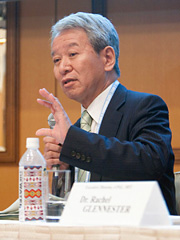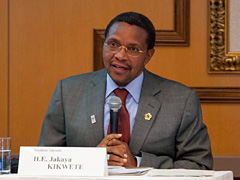Japan International Cooperation Agency President Akihiko Tanaka joined the leaders of African nations, the World Bank, the African Development Bank and others on June 2 for a discussion on African youth unemployment. Solutions discussed emphasized kaizen, small agriculture holders and math and science education.
“The future of Africa depends upon the youth, particularly female youth, should be empowered,” Tanaka said at the event, “TICAD V High Level Panel Discussion on Youth and Employment: Empowering Young Africans to Live Their Dreams.”
The high-level panel discussion, held at InterContinental Yokohama Grand hotel, was part of the fifth Tokyo International Conference on African Development held June 1-3, and co-organized by JICA, the World Bank, African Development Bank and Kobe University.
The event focused on the fact that even as Africa shows impressive economic growth, the vast majority of young Africans lack jobs or are in insecure, low-paying jobs. Participants discussed possible solutions.
They included Ali Bongo Ondimba, the president of Gabon; Jacob Zuma, the president of South Africa; Jakaya Kikwete, the president of Tanzania; Jim Yong Kim, the president of the World Bank; Donald Kaberuka, the president of the African Development Bank; and Rachel Glennerster, executive director of the Abdul Latif Jameel Poverty Action Lab (J-PAL) at the Massachusetts Institute of Technology.
JICA feels young Africans are vibrant, talented, and entrepreneurial, and that the projected rapid expansion of the youth population can be a comparative strength of the African continent in the aging global economy.
At the event, JICA, the World Bank and African Development Bank unveiled a “Joint Recommendation on Youth and Employment in Africa.” JICA and Kobe University presented a policy brief entitled “Empowering Young Africans to Live Their Dreams,” with big contributions from Hiroyuki Hino, JICA expert to the presidency of Kenya, professor Nobuaki Hamagushi of Kobe University and his team.
Glennerster said a review of evidence on improving youth outcomes at J-PAL showed that early investments, in the first 1,000 days of a child’s life, are among the most effective. She said evidence shows early childhood education leads to productivity for youth both in the U.S. and in developing countries.
“One of the best practices for youth employment is this early childhood investment,” she said.

JICA President Akihiko Tanaka discussed JICA’s innovative technical cooperation programs in Africa at TICAD V in Yokohama June 2.
Donald Kaberuka, president of the African Development Bank, emphasized infrastructure. He said infrastructure is easily the place to begin and that poor infrastructure is the No. 1 obstacle to creating jobs in Sub-Saharan Africa. He also described effective interventions to address challenges by country income level, such as education and vocational training in middle-income countries, as well as infrastructure development in low-income countries.
Tanaka said he agreed with Kaberuka on infrastructure. “I would like you to recall that our prime minister Abe declared that Japan is going to use up to $6.5 billion dollars for infrastructure development in Africa. Infrastructure is the basis.”
Tanaka went on to say the guiding principle that must be followed in searching for solutions to youth unemployment is “to take up a select few innovative programs, and test them if they are effective, and if they are effective, scale up.”
Tanaka mentioned JICA’s technical cooperation work in Africa, and gave the example of the Smallholder Horticulture Empowerment Project in Kenya, which “encourages farmers, especially female farmers, to be conscious about the market.” He said farmers are encouraged to check market prices before deciding what seeds to buy for planting. The incomes of those involved have doubled in two years and, “so we are right now trying to scale up and try these examples in other African countries,” he said.
Tanaka also discussed JICA’s Strengthening of Mathematics and Science Education (SMASE) programs in several African countries including Kenya, in which teachers are trained on the most effective way of teaching mathematics and science to improve the quality of education. He claimed JICA can contribute to developing a number of potential human resources for future industries in Africa through these programs.
Bongo Ondimba, the president of Gabon, argued in favor of economic policies for diversification of the economy in Gabon. “Though our country is rich in natural resources, we are trying to diversify our economy for securing of sustainable growth. We can generate jobs by processing natural resources instead of exporting raw material resources.”
He stressed hope in the future. “We have to be optimistic for the future. We know what we have to do. Political decision is very important now.”
Zuma, the South African leader, emphasized skills development to overcome the country’s youth unemployment problem.
"The latest studies showed that almost three quarters, or 72 percent of South Africa's unemployed, are younger than 34," he said.
"The system of apartheid also created a serious skills deficit in our economy," he said, adding that these show up in employment and income differentials.
He said youth unemployment features prominently in South Africa’s recently adopted National Development Plan.
"We have developed a number of sectorial strategies especially focusing on skills development to meet these challenges. The National Development Plan is our blueprint document that will guide us through this challenging task."
Kikwete, the Tanzanian president, emphasized the importance to job creation of processing resources before export. “Instead of exporting iron ore, export steel. Instead of exporting logs, we want to export furniture,” he said.
He added that labor in China and India may not be as cost-effective as they used to be and that African labor may be able to step in to fill the void.
Kim, president of the World Bank, said the problem in Africa is not unemployment as such, but low productivity, noting that poor people work very hard. He said 60 to 70 percent of Africans work on small family farms and household enterprises.
He said it is time to focus on the quality of primary education, now that Africans have succeeded in getting more children into primary school.
Touching on innovative techniques that use software to free teachers to give students individual attention, he added, “There is a chance for Africa to leapfrog [the high-income countries] and do it better.”

Jakaya Kikwete, the president of Tanzania, discussed the importance of exporting processed goods to help create jobs for youth in his country.




scroll